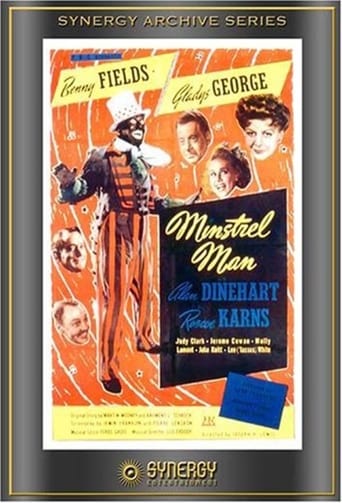llewis001
All the previous reviews/critiques are probably right-on. I was happy to see the film because it presented a bit of theatrical history, showing something of what minstrel shows were like, especially in the opening "Gentlemen Be Seated" bit. Of course, there are similar historical pieces in other movies as well. I don't know that I had ever seen Benny Fields before, although he apparently had done many television appearances in the past, so I was curious to see him and hear him sing. Having seen this film, I rather understand why Ralph Meeker was chosen to play Fields in "Somebody Loves Me" opposite Betty Hutton and I now appreciate that bit of casting.
bkoganbing
I'm not sure and I'm certain to be corrected if I'm wrong, but Minstrel Man might very well be the only PRC film ever to get recognition from the Academy. It received two Oscar nominations for Best Song and for musical scoring. A studio known for its pinch penny budgets for noirs, westerns, and a few horror films producing a musical? It's worth the novelty just to watch the thing.A year before Minstrel Man came out Paramount even used Technicolor in its minstrel film Dixie that starred Bing Crosby. The folks at PRC thought that maybe a minstrel film would work for them. Of course they did not have Crosby or color.The lead here is Benny Fields who was a well known song and dance man and became even better known when he teamed on the stage and in life with Blossom Seeley. Blossom was smart enough to stay away from this.Good song and dance man that he was Fields just couldn't act. When not singing he's wooden and as charming as a wet napkin. The story covers some thirty years of the life of Fields's character Dixie Boy Johnson.The climax involves the revival of minstrel shows. I mean in 1944, really?Seasoned performers like Gladys George and Roscoe Karns are wasted as the surrogate parents to the daughter of Dixie Boy Johnson. And a pretty perky blond like Molly Lamont wants to hide that beauty under cork makeup. Give me a break. It's more than the subject matter that's kept this film under wraps.
dbborroughs
Story of a star performer in minstrel shows who loses his wife in childbirth then gives up on his daughter who begins to rise to prominence as a performer in her own right. Okay backstage drama suffers from a leading man who is a cold fish. Its not clear how he would have been a star of any sort since the actor portraying him has such little charisma that you really don't care and he brings everything down. The music is okay with big production numbers that would make you think this wasn't a Poverty Row film. I know the subject matter of minstrel shows will not sit well with some people. Having seen a couple of similar films set in and around a minstrel show I found this film's portrayal more likely to be offensive then others. As an entertainment in its own right I found it just okay with the lead's poor performance and the subject matter diminishing my enjoyment.
marcslope
The great Al himself might have pounced on the role of a great blackface minstrel singer who, after his wife dies in childbirth, becomes bitter and resentful, leaves his infant daughter with friends, tours in minstrelsy, is supposedly lost in the Morro Castle disaster at sea, and miraculously returns to be reunited with his now-grown-up little girl, who is opening in a brand-new 1944 minstrel show. The movie blithely pretends that minstrel shows are still up-to-date and wildly popular, and thus exists in a kind of vacuum. The fine Hollywood songwriter Harry Revel, who had seen better days, wrote the very derivative melodies, which were scored by no less than Ferde Grofe (of the "Grand Canyon Suite"), and it looks like the Grade-Z studio, PRC, actually spent some money on the sets and costumes, if not the cast, which consists mostly of folks on the way up or down. Gladys George, an actual Best Actress Oscar nominee back when (for "Valiant is the Word for Carrie"), lends some minimal class, and Roscoe Karns gets to display more range than his A pictures granted him; even a young, full-voiced John Raitt turns up, though he's unrecognizable in blackface. Benny Fields is, as other posters have noted, no actor and not the best vocalizer, either, but he does convey some sincerity, and it's kind of touching to see such an unappetizing and over-the-hill guy attempt a conventional leading man role. Judy Clark, as his daughter, has the pizazz and confidence of an A-picture starlet. If you can stomach all the blackface (and there's a lot of it) and the clichés piling up, you'll be pleased at the picture's efficiency and unpretentiousness. And watching a "Mammy"-"Sonny Boy"-style story nearly 20 years after it went out fashion is sort of fascinating.


